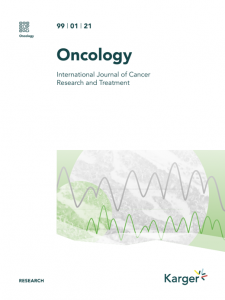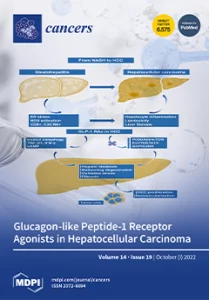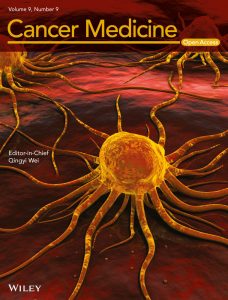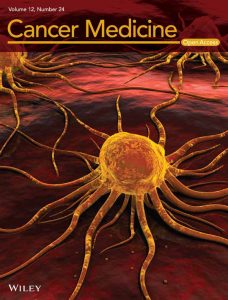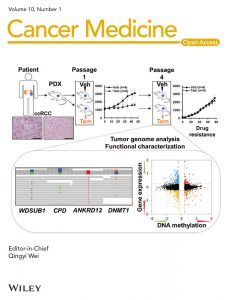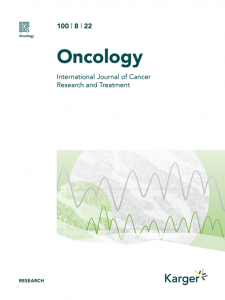Translational & Clinical Research
Clinical and translational research studies are created and led by clinician-investigators and scientists at academic institutions. This type of research is done to learn and understand more about gastroesophageal cancers and utilize the knowledge gained to develop more personalized and effective treatments for future patients.
Actively Recruiting
Principal Investigators: Drs Elena Elimova and Jonathan Yeung
The purpose of this study is to see how useful it is to look for changes and characteristics in your genes (molecules that contain instructions for the development and functioning of the cells in your body) and the genes within the tumour. These characteristics may be useful in choosing treatments for patients in the future. Participants will be asked for their: clinical information related to the study, extra tissue to be taken for research during biopsies/surgeries, blood samples, and stool samples.
General Eligibility:
- Age ≥ 18 years old
- Must have a histological or suspected diagnosis of gastroesophageal adenocarcinoma
- Patients must have a primary and/or metastatic tumour lesion amenable to biopsy prior to starting systemic therapy
- Patients must be fit enough to safely undergo a tumour biopsy as judged by their oncologist
Principal Investigator: Dr Elena Elimova
The purpose of this study is to build a repository of biological samples and clinical and radiological data of gastroesophageal and endocrine cancer patients being seen at Princess Margaret Cancer Centre and to learn more about these types of cancers. This large registry will allow researchers to identify genetic mutations (changes) and learn about other biomarkers related to cancer; understand better what makes gastroesophageal and endocrine cancers grow and how patients do with treatment based on their tumour biology; and develop more targeted treatments.
General Eligibility:
- Age ≥ 18 years old
- Must have a histological or suspected diagnosis of gastroesophageal adenocarcinoma/squamous cell carcinoma or endocrine cancer
- Must not be actively enrolled on MOCHA
Principal Investigator: Dr Patrick Veit-Haibach
In this study, we will use a technology called PET-MR that combines a Positron Emission Tomography (PET) scan with Magnetic Resonance Imaging (MRI) scan. The PET-MR scan in this study is performed after the injection of a radiotracer (“dye” which is a substance that shows areas with lack of oxygen in your body), called 18F-Fluoroazomycin Arabinoside (FAZA). This “dye” has already been used in other patients with other conditions at UHN, however it is investigational in this setting. This study intends to identify some predictive scan markers (in FAZA PET/MR), such as lack of oxygen in in your tumor/metastases, that could account for this outcome and help doctors choose the best treatment option in specific cases.
General Eligibility:
- Age ≥ 18 years old
- Patients with de novo or secondary metastasized gastroesophageal cancer (adenocarcinoma)
- No allergy to contrast agents
Principal Investigator: Dr Elliot Wakeam
This study studies the incidence of iron deficiency anemia across the continuum of care in adult patients undergoing treatment for esophageal cancer.
General Eligibility:
- Age ≥ 18 years old
- Diagnosed with esophageal cancer and gastroesophageal junction cancer who are scheduled to undergo treatment including surgery, radiation therapy, chemotherapy, or any combination of these modalities
Principal Investigators: Drs Philippe Bedard and Benjamin Haibe-Kains
OCTANE tests archival tumor samples (previously collected biopsy or surgical tumor samples) to provide biomarker data about a patient’s cancer. This information may help physicians in guiding the use of approved treatments that may benefit their patient as well as identifying which clinical trials of new drug treatments may be most appropriate for the patient in the future. This study is offered at multiple sites across Ontario.
Principal Investigator: Dr Elena Elimova
This study will aim to investigate the relationship and the differences between the gut microbiome and GE cancer by using healthy individuals living in the same environment as the GE cancer patient to compare the microbial species. This could potentially be a helpful diagnostic and therapeutic tool for GE cancers.
General Eligibility:
- Age ≥ 18 years old
- Non-patient, living full time in the same home for a minimum of 1 year consecutively, with a patient diagnosed with GE cancer
- Participant’s household member with GE cancer has donated or is donating stool under another respective study protocol (MOCHA or GEAR)
Principal Investigator: Dr Karineh Kazazian
Principal Investigator: Dr Karineh Kazazian
This is a study looking to evaluate the molecular characteristics, immune profile, epidemiological, radiological, and corresponding clinical data of gastrointestinal cancers (gastric, colorectal, and small bowel).
General Eligibility:
- Age >=18
- Undergoing a curative-intent resection or biopsy of gastric, colorectal, or small bowel cancer
Clinical Trials
Clinical trials are research studies that study the safety and efficacy of a new intervention (example, drug, device, procedure) in human participants.
Please ask your medical oncologist about clinical trials and whether you are eligible for any active trials at Princess Margaret or other cancer centres.
Actively Recruiting
Referral from your oncologist is required.
First Line Trials
Full Title: A Randomized, Phase Ⅲ Study of Rilvegostomig in Combination with Fluoropyrimidine and Trastuzumab Deruxtecan versus Trastuzumab, Chemotherapy, and Pembrolizumab for the First-line Treatment of HER2-positive Gastric Cancer
Principal Investigator: Dr Elena Elimova
Treatment Line: First Line (1L)
This is a Phase 3 study in participants with gastric or gastroesophageal junction (GEJ) adenocarcinoma that has an extra expression of programmed cell death ligand 1 (PD-L1) and human epidermal growth factor receptor 2 (HER2) protein.
This study aims to learn more about the efficacy and safety of the investigational drug rilvegostomig in combination with trastuzumab deruxtecan (T-DXd) and capecitabine or 5-fluorouracil (5-FU) versus trastuzumab, pembrolizumab, and chemotherapy.
Full Title: A Phase 1b/2 Multicenter, Open-label, Dose-escalation and Dose-expansion Study to Evaluate the Safety, Tolerability, Pharmacokinetics, Immunogenicity, and Antitumor Activity of Trastuzumab Deruxtecan (T-DXd) Monotherapy and Combinations in Adult Participants With HER2-expressing Gastric Cancer
Principal Investigator: Dr Eric Chen
Treatment Line: 1L
DESTINY-Gastric03 will investigate the safety, tolerability, pharmacokinetics, immunogenicity, and preliminary antitumor activity of trastuzumab deruxtecan (T-DXd) alone or in combination with chemotherapy and/or immunotherapy in HER2-expressing advanced/metastatic gastric/gastroesophageal junction (GEJ) and esophageal adenocarcinoma patients. Part 5 will enroll HER2-expressing patients who have not received prior treatment for metastatic or unresectable disease.
Full Title: A Phase 2 Randomized Study to Evaluate the Safety, Efficacy, and Optimal Dose of Telisotuzumab Adizutecan in Combination with Fluorouracil, Leucovorin, and Budigalimab as First-Line Treatment in Subjects with Locally Advanced Unresectable or Metastatic Gastric, Gastroesophageal Junction, or Esophageal Adenocarcinoma
Principal Investigator: Dr Elena Elimova
Treatment Line: 1L
This is a phase 2, randomized study evaluating the safety and tolerability of ABBV-400 in combination with 5-FU, LV, and budigalimab, for the treatment of inoperable, advanced or metastatic gastric, gastroesophageal junction, or esophageal adenocarcinoma. ABBV-400 is an antibody drug conjugate (ADC) consisting of a c-Met targeting antibody conjugated to a potent inhibitor of topoisomerase 1 payload.
Full Title: A Randomized Phase II Study of Paclitaxel and Ramucirumab +/- Zanidatamab in HER2 Positive Advanced Gastroesophageal Adenocarcinoma
Principal Investigator: Dr Elena Elimova
Treatment Line: 2L+
The purpose of this study is to compare the usual approach alone to using zanidatamab plus the usual approach. The addition of zanidatamab to the usual approach could shrink cancer. But, it could also cause side effects.
This study will help the study doctors find out if this different approach is better than the usual approach. To decide if it is better, the study doctors will be looking to see if adding zanidatamab to the usual approach reduces the risk of cancer getting worse by at least 37% compared to the usual approach.
Full Title: Chemoimmunotherapy followed by Surgery for Oligometastatic Esophageal and Gastric Cancer
Principal Investigator: Dr Elliot Wakeam
The purpose is to evaluate the overall survival outcomes for patients undergoing systemic treatment, primarily with chemoimmunotherapy, followed by surgery in patients with oligometastatic esophageal and GEJ cancer.
General Eligibility:
- Age >18 and <80 years old
- Adenocarcinoma or squamous cell carcinoma of the esophagus or EGJ (type I, II and III according to Siewert classification of esophagogastric adenocarcinoma)
- A resectable primary tumor in combination with oligometastatic disease at the time of enrollment
Full Title: Neoadjuvant Chemoradiotherapy and Surgery for Esophageal Squamous Cell Carcinoma Versus Definitive Chemoradiotherapy With Salvage Surgery as Needed
Principal Investigator: Dr Jelena Lukovic
Treatment Line: Definitive/Curative
This is an international phase III open-label randomized study designed to compare outcomes after chemotherapy and radiotherapy followed by surgery with definitive chemotherapy and radiotherapy with surveillance in esophageal cancer patients and, if necessary, surgery to remove the remaining parts of a tumour, known as “salvage esophagectomy”. The trial also aims to determine if health-related quality of life is superior by avoiding esophagectomy in a proportion of patients.
Full Title: Neoadjuvant Chemoradiotherapy and Surgery for Esophageal Squamous Cell Carcinoma Versus Definitive Chemoradiotherapy With Salvage Surgery as Needed
Principal Investigator: Dr Jelena Lukovic
Treatment Line: Definitive/Curative
This is an international phase III open-label randomized study designed to compare outcomes after chemotherapy and radiotherapy followed by surgery with definitive chemotherapy and radiotherapy with surveillance in esophageal cancer patients and, if necessary, surgery to remove the remaining parts of a tumour, known as “salvage esophagectomy”. The trial also aims to determine if health-related quality of life is superior by avoiding esophagectomy in a proportion of patients.









